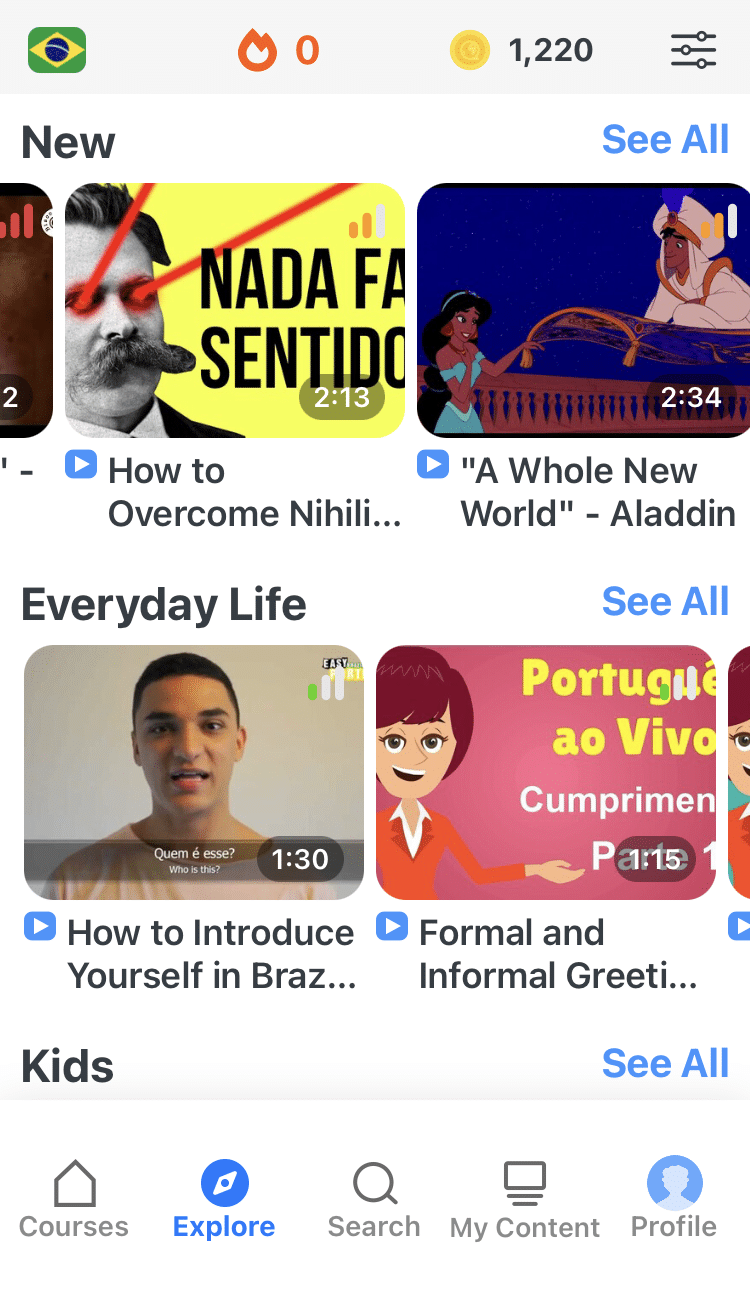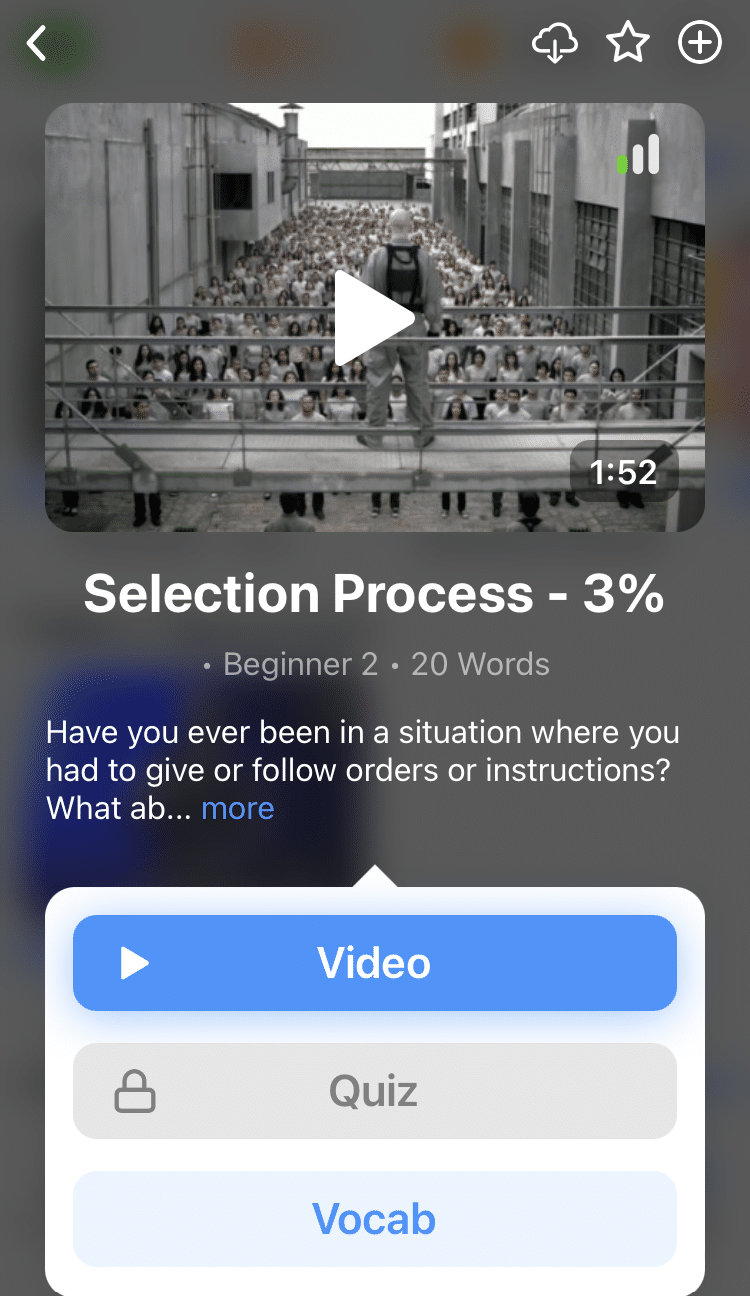
10 Ways to Say “I Love You” in Portuguese
My darling, my love, my squash—there are several terms of endearment and ways to say “I love you” in Portuguese.
If Portuguese isn’t your native language, then aside from expressing your love, you’ll also have to consider how to use the language correctly.
Whether you love someone who’s Portuguese or you want to talk about things that you adore, this post will introduce you to the right words and expressions.
Contents
- 1. Te amo — I love you
- 2. Te amo muito — I love you very much
- 3. Eu gosto mesmo de você — I really like you
- 4. Te adoro — I adore you
- 5. Eu estou me apaixonando por você — I am falling in love with you
- 6. Estou apaixonado — I am in love
- 7. Você é o amor da minha vida — You’re the love of my life
- 8. Você é tudo para mim — You’re everything to me
- 9. Você é o dono/a do meu coração — You’re the owner of my heart
- 10. Eu te amo mais do que tudo — I love you to the moon and back
- Portuguese Terms of Endearment
- How to Practice Expressing Your Love in Portuguese
- And One More Thing…
Download: This blog post is available as a convenient and portable PDF that you can take anywhere. Click here to get a copy. (Download)
1. Te amo — I love you
The key verb in this phrase is amar , which means “to love.”
It’s similar to the noun for love in Portuguese, amor , which refers to a deeply romantic, familial or platonic bond. It’s also a term of endearment.
For example, you can refer to someone as meu amor (my love). This affectionate term applies to a family member, a romantic partner and even a friend.
If you want to tell someone that you love them in Portuguese, te amo can work for parents, close friends or your partner.
2. Te amo muito — I love you very much
In Portuguese, te amo signifies love, and by adding muito to the mix, you’re taking that sentiment to a whole new level.
Imagine you’re standing on the vibrant streets of Lisbon, and, as you look into your loved one’s eyes, you express “Eu te amo muito, minha querida” (I love you very much, my dear).
Here, muito amplifies the depth of your emotions, making it a perfect choice for those moments when you want to express how much you love someone.
3. Eu gosto mesmo de você — I really like you
Now, let’s take a step back and look at a way of saying how much you like someone. Eu gosto mesmo de você goes beyond a simple “I like you” by adding mesmo, which literally means “really” and used to emphasize the sincerity of your liking.
This expression is perfect for acknowledging when you have a genuine connection with someone and want to express how much you like them.
It’s a versatile phrase that can be used with friends, potential romantic interests, or anyone you appreciate on a personal level.
4. Te adoro — I adore you
The more common verb to express quotidian love for people and objects in Portuguese is adorar , which literally means “to adore,” and is often used to mean “to like a lot.”
If you don’t quite feel ready enough to express your love with a heartfelt te amo, you can use te adoro instead, which signals that you like someone… a lot!
Additionally, you use the verb adorar to express great affinity for places, objects and activities.
For example, do you really, really like coffee?
Instead of Amo café (I love coffee), which sounds like you harbor romantic feelings for your coffee, you can say, “Adoro café” (I really like coffee).
Similarly, if you want to express a desire in the conditional tense, you would use the conditional form of adorar in Portuguese.
For example:
Eu adoraria ir ao Brasil. (I would love to go to Brazil.)
When in doubt, use the verb adorar instead of amar in Portuguese to express an affinity.
5. Eu estou me apaixonando por você — I am falling in love with you
Now we enter some seriously romantic territory. In Portuguese, to express the sensation of falling deeply in love with someone, you use the reflexive verb apaixonar-se . It means “to fall in love with,” or literally, “to be impassioned by someone.”
The question of verb tense can be tricky here, as it points to the precise point in time when falling in love takes place. For example, to tell someone, “I am falling in love with you,” you use the present continuous: Eu estou me apaixonando por você.
You can also use the past simple tense.
Me apaixonei por você. (I have fallen in love with you).
This signals a serious commitment to your romantic partner.
6. Estou apaixonado — I am in love
After you have fallen in love, you experience the state of being in love. Just as in English, you use the verb estar (to be) with apaixonado por (in love with) to express this state in Portuguese.
Use this phrase to say, “I am in love” in Portuguese. And when you say it, mean it!
7. Você é o amor da minha vida — You’re the love of my life
We’ve reached peak romantic intensity with this phrase! After all, it’s one thing to tell someone that you love them, and another to tell them they’re the person you’ve loved most in your whole life.
It’s a pretty straightforward sentence. However, do note that it’s not translated directly—the contraction da (of the) might catch a few beginners out, but it’s also a good demonstration of how Portuguese uses definite articles more than English does.
At any rate, consider yourself lucky if you ever get to use this phrase.
8. Você é tudo para mim — You’re everything to me
Now we’ve arrived at some more indirect ways of expressing love!
The following two phrases could be helpful if you’re not exactly ready to utter the “a word” (amo) out loud, but want to let someone know you love them all the same.
In informal Portuguese, people might swap the para in this phrase for pra, but the meaning doesn’t change.
9. Você é o dono/a do meu coração — You’re the owner of my heart
Another indirect (but actually not that indirect) way of saying “I love you” in Portuguese is você é o dono/a do meu coração.
It’s another good example of definite article use in Portuguese, with the contraction do (of the) used in Portuguese where we would just use “of” in English.
Also remember that dono (owner) is used with male-identifying individuals, and dona is used for female-identifying.
10. Eu te amo mais do que tudo — I love you to the moon and back
If you’re looking for a way to declare your love poetically, the expression Eu te amo mais do que tudo (I love you to the moon and back) is guaranteed to melt your partner’s heart.
This phrase beautifully captures the sentiment of going to great lengths to express the magnitude of your love.
Portuguese Terms of Endearment
There are endless terms of endearment to express affection towards romantic partners and family members in Portuguese. Below is a list of the most common.
Note that some are gender-neutral, in which case you always apply the masculine possessive pronoun meu (my) before the noun.
In other cases, the gender of the possessive pronoun is based on the gender of the person to whom you are speaking.
Meu querido (m.) / Minha querida (f.) — My dear
Meu lindo / Minha linda (f.) — My beautiful
Meu docinho — My sweet
Meu bem — My darling
Meu xuxu (m.) / chuchu (f.) — My squash
Meu fofinho — My softie, cutie
Minha vida — My life
Meu gatinho (m.) / Minha gatinha (f.) — My kitty
Meu coração — My heat
Minha paixão — My passion
Meu anjo — My angel
Minha estrela — My star
Meu raio de sol — My ray of sunshine
Minha joia — My jewel
Meu sol e lua — My sun and moon
Meu porto seguro — My safe harbor
Minha pérola — My pearl
Meu bem-querer — My beloved
Meu raio de lua — My moonbeam
Minha doce metade — My sweet half
Meu farol — My lighthouse
How to Practice Expressing Your Love in Portuguese
With all these romantic phrases in Portuguese, here are some tips for getting more comfortable with saying them.
Listen to music
Brazilian music is full of references to love, dating, passion and all of the confusion that surrounds the ritual of courtship.
There is a variety of Portuguese-language radio stations freely available online. Radio Transamérica is a great place to listen to popular Brazilian music (known as MPB — Música Popular Brasileira).
To practice expressions of love, look for Brazilian artists like Ivete Sangalo, Caetano Veloso and Jorge Ben Jor. Print out lyrics ahead of time and re-listen to your favorite songs to retain valuable phrases and their contextual meanings.
Another great resource for selecting your favorite Brazilian tunes is Celebrate Brazil, an online collection dedicated to the rich history of Brazilian music.
If you’re learning the European flavor of Portuguese, you can find many love song suggestions in this Quora thread.
Or you can dive right into the music with a YouTube playlist consisting of a mix of Brazilian and mainland Portuguese love songs.
Watch romantic comedies
Observing native Portuguese speakers in a variety of familiar and romantic interactions will help you see how locals naturally use terms of love and endearment.
Films like “Central Station,” “Bossa Nova” and “Lower City” are all excellent Brazilian movies to watch and observe how native speakers employ the vocabulary of love. For romantic comedies from Portugal, check out films like “A Mulher do Próximo” (The Neighbor’s Wife), “Um Crime de Luxo” (Death in a White Tie) and “Maria and the Others.”
FluentU takes authentic videos—like music videos, movie trailers, news and inspiring talks—and turns them into personalized language learning lessons.
You can try FluentU for free for 2 weeks. Click here to check out the website or download the iOS app or Android app.
The interactive subtitles allow you to see what phrases mean right away, with post-video quizzes that test your speaking skills:
Enroll in a language exchange program
Whether online or in-person, conversing with a native speaker will improve your ability to naturally speak any language. It also provides the opportunity to ask language partners real questions about how they use their language, rather than relying on direct online or dictionary translations.
If you are looking for an online option, Tandem is a website and app that connects you with language partners online, and enrollment is free.
For in-person exchanges, you can consult Meetup to discover a variety of events in your area hosted by native Portuguese speakers and highlight cultural activities.
Fall in love
To really experience love in Portuguese, perhaps the best way is to fall in love with a native speaker. Or develop a deep personal friendship. Or even study abroad with a host family!
Ultimately, the rules of grammar cannot fully govern or categorize a human connection as profound as love. Learning to love actually and fully in any language, including Portuguese, requires practice. Maybe you’ll become Plato’s love poet after all.
Whether you’re expressing undying love for your other half or adoration for your darling little xuxu, the words and phrases here will help you say “I love you” in Portuguese!
Download: This blog post is available as a convenient and portable PDF that you can take anywhere. Click here to get a copy. (Download)
And One More Thing…
If you've made it this far that means you probably enjoy learning Portuguese with engaging material and will then love FluentU.
FluentU takes authentic videos—like music videos, movie trailers, news and inspiring talks—and turns them into personalized Portuguese lessons.
Other sites use scripted content. FluentU uses a natural approach that helps you ease into the Portuguese language and culture over time. You’ll learn Portuguese as it’s actually spoken by real people.
FluentU has a wide variety of videos, as you can see here:

FluentU brings native videos within reach with interactive transcripts. You can tap on any word to look it up instantly. Every definition has examples that have been written to help you understand how the word is used. If you see an interesting word you don’t know, you can add it to a vocab list.

Review a complete interactive transcript under the Dialogue tab, and find words and phrases listed under Vocab.

Learn all the vocabulary in any video with FluentU’s robust learning engine. Swipe left or right to see more examples of the word you’re on.

The best part is that FluentU keeps track of the vocabulary that you’re learning, and gives you extra practice with difficult words. It'll even remind you when it’s time to review what you’ve learned. Every learner has a truly personalized experience, even if they’re learning with the same video.
You can try FluentU for free for 2 weeks. Click here to check out the website or download the iOS app or Android app.





